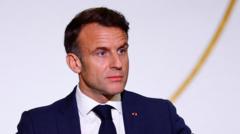Macron's claim, stating that "no Sahelian nation would be a sovereign nation" without French intervention, led Chad's Foreign Minister, Abderaman Koulamallah, to express concerns regarding what he described as "contempt" for Africa. He emphasized that French leaders must respect African populations and acknowledge their sacrifices. Echoing these sentiments, Senegal’s Prime Minister Ousmane Sonko highlighted France's past actions, suggesting its interventions have historically destabilized nations like Libya, which have had lasting negative effects on regional security.
In the context of France's military presence in West Africa, Macron mentioned the rightness of deploying French troops to combat Islamist insurgencies that began in Mali in 2013. However, this intervention has been increasingly critiqued, especially as former colonies like Chad and Senegal have moved to end military agreements and assert their sovereignty.
Amid a growing trend of military coups in the region leading to a distance from French influence, both Chad and Senegal, along with other nations, have reevaluated their alliances and partnerships, indicating a shift toward new international relationships. Sonko emphasized that Senegal's decision on French military presence was derived from its sovereignty rather than negotiation, calling Macron's viewpoint on the matter "totally wrong."
The declarations from Chad and Senegal come at a time when France's historical role in Africa is being scrutinized, with accusations of neo-colonialism and self-serving interests arising amid its efforts to stabilize conflict-ridden nations. This evolving narrative reflects broader shifts in Africa's political landscape and its relationships with former colonial powers.
In the context of France's military presence in West Africa, Macron mentioned the rightness of deploying French troops to combat Islamist insurgencies that began in Mali in 2013. However, this intervention has been increasingly critiqued, especially as former colonies like Chad and Senegal have moved to end military agreements and assert their sovereignty.
Amid a growing trend of military coups in the region leading to a distance from French influence, both Chad and Senegal, along with other nations, have reevaluated their alliances and partnerships, indicating a shift toward new international relationships. Sonko emphasized that Senegal's decision on French military presence was derived from its sovereignty rather than negotiation, calling Macron's viewpoint on the matter "totally wrong."
The declarations from Chad and Senegal come at a time when France's historical role in Africa is being scrutinized, with accusations of neo-colonialism and self-serving interests arising amid its efforts to stabilize conflict-ridden nations. This evolving narrative reflects broader shifts in Africa's political landscape and its relationships with former colonial powers.




















